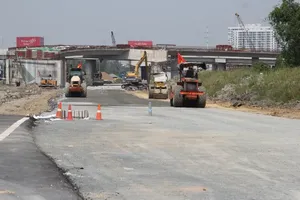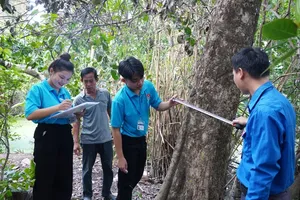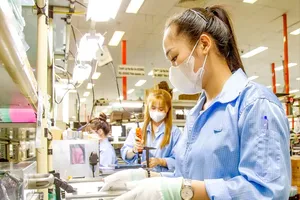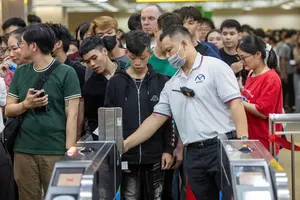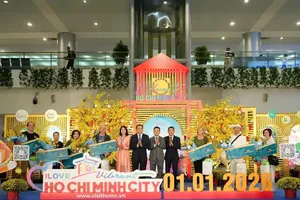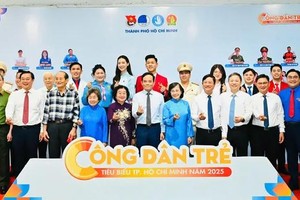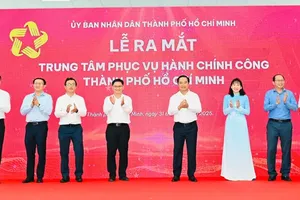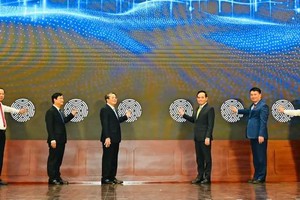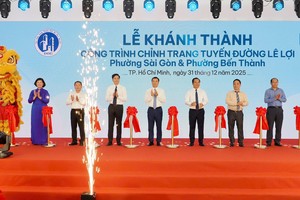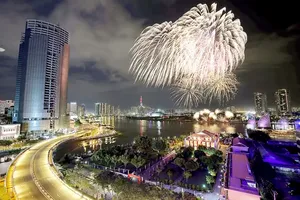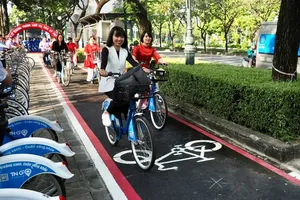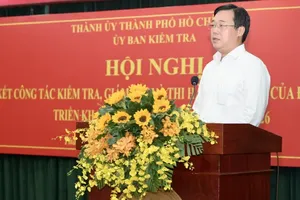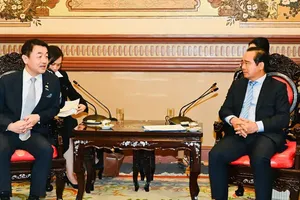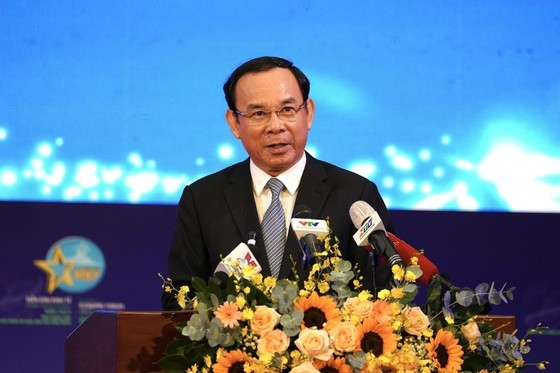 |
Secretary Nguyen Van Nen of the HCMC Party Committee speaks at the HEF 2023. |
During his opening speech at the forum, Secretary Nguyen Van Nen of the HCMC Party Committee emphasized that HCMC, like many other cities around the world, has experienced the tangible effects of climate change, along with the shortcomings that need to be resolved, urging us to bond closely and act more strongly and effectively.
According to Mr. Nguyen Van Nen, HCMC is acutely aware that the traditional economic growth model is no longer the optimal choice. Therefore, the city has shifted direction, embarking on a new journey towards green growth with a vision for a sustainable future.
Accordingly, HCMC is urgently finalizing its green development strategic framework for 2030 with a vision towards 2050, aiming to transform HCMC into a civilized and modern urban center, rich in cultural values and an attractive destination for investors and tourists.
The strategic framework prioritizes citizens as the focal point of digital transformation, with a focus on regional connectivity and international collaboration to accomplish four key pillars.
They comprise the development of green resources, the construction of green infrastructure, the promotion of green behaviors, and the identification of pioneering sectors and fields. After the forum, the city will integrate feedback to refine the strategic framework and proceed with the action plan, complete with specific tasks and timelines.
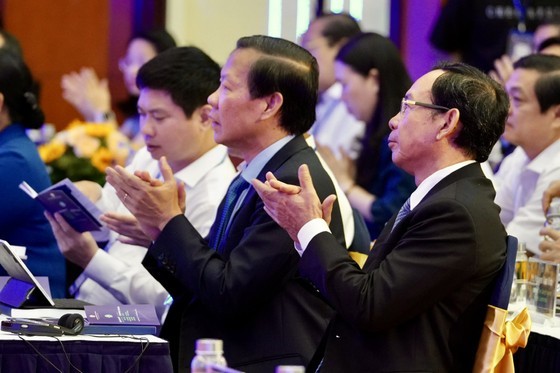 |
An overview of the event |
The forum is one of the key initiatives aimed at translating the collaboration outlined in the agreement inked between the Government of Vietnam and the World Economic Forum on June 26, 2023, into concrete actions. It also serves as a platform for discussions regarding the establishment of a Fourth Industrial Revolution Center in HCMC, aimed at enhancing collaboration with similar centers worldwide and providing innovative solutions tailored to HCMC's unique needs, aligning with both national and global trends and standards. Simultaneously, it seeks to mobilize investment resources for renewable energy, greenhouse gas reduction, the development of public transportation systems, air pollution mitigation, and energy and resource conservation.
HCMC is actively implementing strategies to foster innovation and development, fostering a favorable environment and opportunities for the business community to join hands in the green growth journey, with the ultimate goal of achieving net-zero emissions.
Substantial green transformation potential between HCMC and Shanghai
Ms. Sun Ming, Deputy Chairwoman of the Standing Committee of the People's Congress of Shanghai, China, presented a lecture on "Policies for Advancing Green Growth Toward Net-Zero Emissions and the Role of Enterprises."
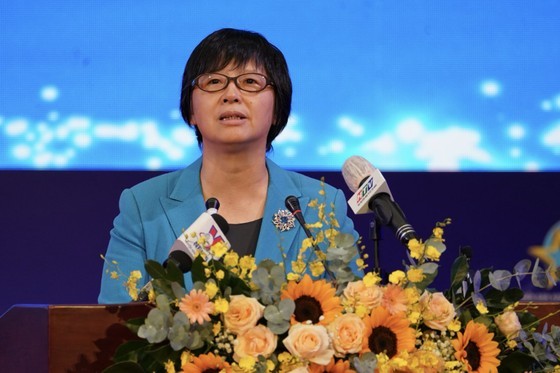 |
Ms. Sun Ming, Deputy Chairwoman of the Standing Committee of the People's Congress of Shanghai, speaks at the event. |
She shared the story of Shanghai - a city full of energy and effectively manages global resources, fostering innovative growth for businesses and industries. In 2022, Shanghai's GDP surged to 4.47 trillion Chinese yuan, solidifying its position as the world's fourth-largest city and the second-largest in Asia by GDP. Furthermore, the GDP per capita reached an impressive US$26,800.
As an international financial hub, an international transport center, and a hub for science and technology, Shanghai is also a green, low-carbon, and environmentally friendly city. The green and low-carbon transformation in Shanghai holds great significance in reducing global temperatures, ensuring energy security, and achieving sustainable development. The Chinese government has committed to making efforts to peak its carbon dioxide emissions before 2030 and achieve carbon neutrality by 2060.
"We have improved the ecosystem in Shanghai to bring more green spaces, clearer skies, and cleaner water for citizens. Over the past ten years, the annual average concentration of PM2.5 in Shanghai has reduced from 62 micrograms per cubic meter to just 25 micrograms per cubic meter," Ms. Sun Ming said, noting that the city has primarily promoted green and low-carbon transformations in the fields of energy, industry, environment, transportation, and social recycling.
Ms. Sun Ming highlighted that since the establishment of the sister city relationship between Shanghai and HCMC in 1994, both cities have fostered exchanges and cooperation in numerous domains, spanning trade, commerce, education, and more. She emphasized the substantial potential for collaborative efforts between the two cities in advancing green and low-carbon initiatives in the future. She urged both cities to unite and make greater contributions to green growth and low-carbon initiatives.
Promoting conscious consumption
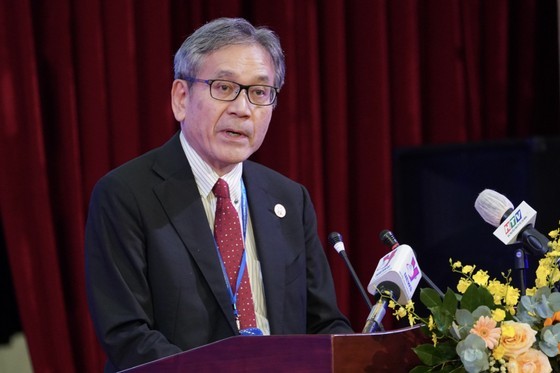 |
Mr. Yasuo Takahashi delivers a speech at the HEF 2023. |
In his address, Mr. Yasuo Takahashi, Former Deputy Minister of the Environment of Japan and Executive Director of the Institute for Global Environmental Strategies (IGES), emphasized the increasingly robust collaborative relationship between the two nations. “Our shared goal is clear: to achieve net-zero emissions. Mitigating the rise in global temperatures is not only vital for our region but also holds immense significance for the entire world. It requires significant shifts in financial policies and technological advancements and presents substantial opportunities for fostering innovation and enhancing public health. Japan has put forth several scenarios for net emissions reduction, including one in which approximately 80 percent of carbon dioxide is eliminated, yet alternative energy sources are still required, impacting the environment.
Mr. Yasuo Takahashi explained that they acknowledged the importance of consistently impacting people's consumption behavior. He also mentioned the close collaboration among government departments due to the fact that numerous regions in Japan had unveiled emission reduction plans that were more ambitious and accelerated compared to the national roadmap. Additionally, he noted their cooperation with major Vietnamese cities like Hanoi, HCMC, Da Nang, and Can Tho.
Green transition: A joint effort
Mr. Jan Jambon, Minister-President of the Government of Flanders, Belgium, Flemish Minister for Foreign Policy, Culture, Digitization, and Facilities, emphasized that over the past 50 years, since the establishment of diplomatic relations on March 22, 1973, the partnership between Vietnam and Belgium has consistently grown and evolved in terms of both quantity and quality. What is remarkable is that during this green transition, the two countries are not standing alone but progressing together.
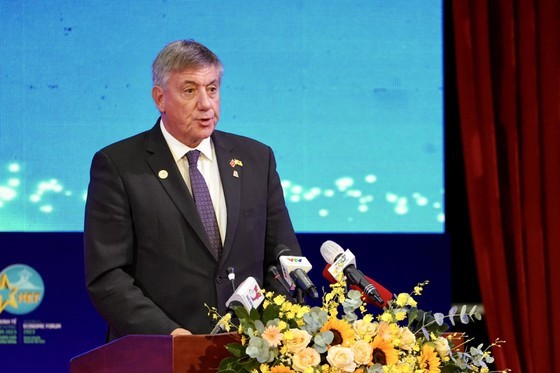 |
Mr. Jan Jambon, Minister-President of the Government of Flanders, Belgium, Flemish Minister for Foreign Policy, Culture, Digitization, and Facilities |
"Over the past time, HCMC, and Vietnam as a whole, have assumed an increasingly significant role in the regional development landscape, showcasing a dynamic and innovative economy. Meanwhile, Flanders, with its large petroleum industry, and Belgium also face environmental challenges. Nevertheless, we have committed a substantial portion of our GDP to drive technological innovation and environmental protection, with a special focus on applying artificial intelligence (AI). Through technological advancements, we have progressively addressed intricate issues and achieved a recycling rate of nearly 50 percent for various types of waste released into the environment. Crucially, sustainable policies and mechanisms will play a pivotal role in advancing net emissions reduction and fostering the gradual effectiveness of the circular economy, contributing to inspiring nations, regions, and territories across the globe," said Mr. Jan Jambon.
Presentations by six key speakers
After the opening remarks, Mr. Jeremy Jurgens, CEO and Director of the Fourth Industrial Revolution Center at the World Economic Forum (WEF), gave the inaugural lecture on Green Growth and Circular Economy Trends in Mega-Cities.
According to Mr. Jeremy Jurgens, the world is grappling with various challenges. Besides a rising number of conflicts and natural disasters, there are notable accomplishments and groundbreaking technologies reshaping traditional business practices. However, the responsible application of these technologies and achievements is crucial for fostering sustainable development.
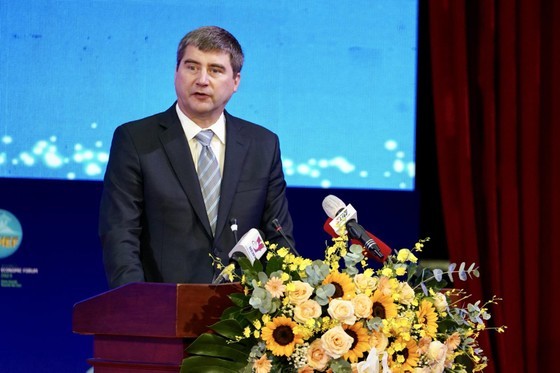 |
Mr. Jeremy Jurgens, CEO and Director of the Fourth Industrial Revolution Center at the World Economic Forum (WEF), addresses at the HEF 2023. |
He underscored the role of cities, labeling them as "emission hubs," where more than 50 percent of the global population resides, contributing to 70 percent of emissions. These statistics are projected to rise in the future, necessitating solutions to mitigate the adverse consequences of this phenomenon.
Mr. Jeremy Jurgens outlined various initiatives the WEF is executing within its network. These initiatives include the concept of Net-zero Cities, where governments and businesses cooperate to advance a more sustainable future. Additionally, there is the Precision Agriculture initiative, aiding farmers in adopting sustainable farming practices that contribute to economic greening with remarkable reductions in emissions and water conservation ranging from 5-10 percent, along with a 10 percent increase in productivity.
Furthermore, there is the Advanced Manufacturing initiative, that holds significant importance due to the industrial sector's contribution of 30 percent to carbon dioxide emissions.
The WEF representative expressed that their network aimed to facilitate mutual learning among nations for the responsible application of transformative technologies to tackle economic challenges. They emphasized their readiness to cooperate with HCMC in expanding this network and jointly enhancing the city's green initiatives.

